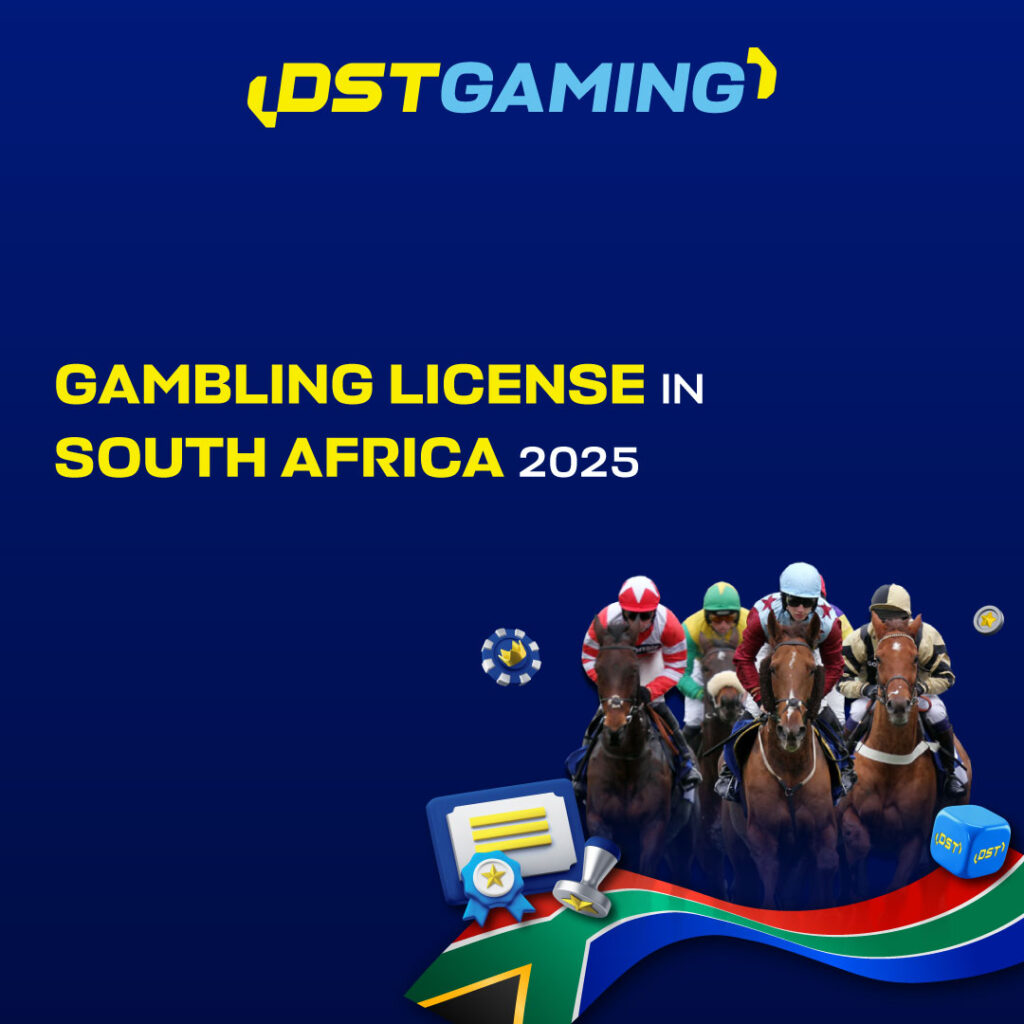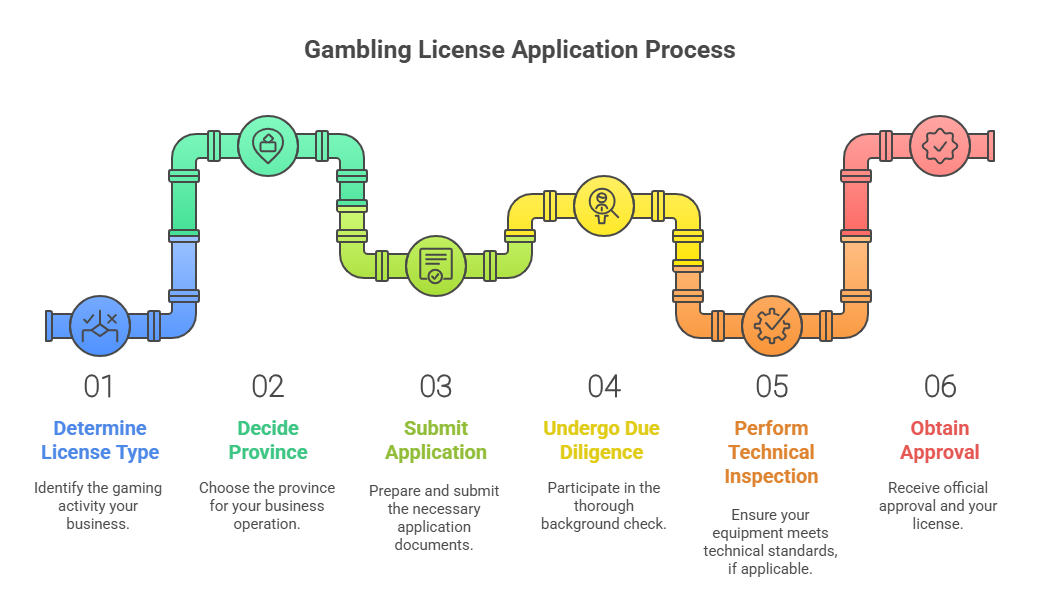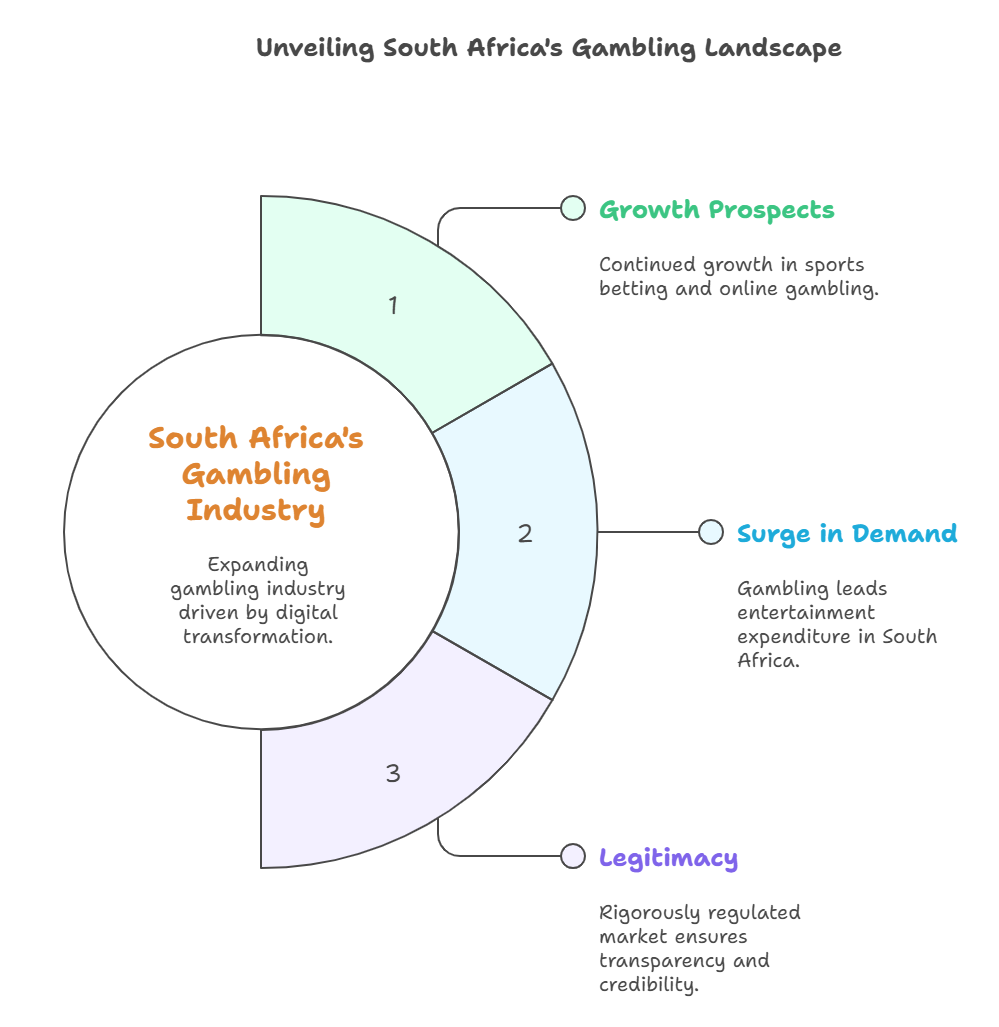Gambling License in South Africa 2025

South Africa, the largest gambling market in Africa, driven by progressive legislation and a robust betting culture. Its gambling and betting industry is among the fastest-growing industries within the country’s personal services industry. A recent report by Stats SA confirms this trend. The report reveals that gambling services generated R152.6 billion (about $8.5 billion) in 2023–an astonishing leap from R10.1 billion (about $560 million) in 2018. This represents a growth of over 1,400% in just five years. Such exponential growth is attracting increasing interest from entrepreneurs looking to invest in South Africa’s expanding gambling industry.
Gambling activities in South Africa are governed by comprehensive legislation and strict enforcement. This article provides comprehensive insights and guides you through the process of securing a gambling license in South Africa, equipping you for a successful venture in South Africa’s gambling market.
Overview of Gambling License in South Africa
In South Africa, the gambling industry is regulated by both national and provincial legislation. The National Gambling (NGB) was established in 2004 and empowered to oversee the gambling industry regulation across South Africa. Meanwhile, provincial gambling boards are responsible for licensing and regulating operators within their respective jurisdictions. To lawfully conduct gambling activities in South Africa, securing a gambling license is a mandatory legal requirement.
South Africa’s Nine Provinces and Gambling Regulation
South Africa is divided into nine provinces. Each province has its own regulatory authority that is responsible for administering the licensing process within its jurisdiction. Therefore, applicants must apply directly to the relevant provincial board based on where they intend to set up their business.
The nine Provincial Licensing Authorities (PLAs) are:
- Gauteng Gambling Board
- Western Cape Gambling and Racing Board
- KwaZulu-Natal Gaming and Betting Board
- Eastern Cape Gambling and Betting Board
- Free State Gambling and Liquor Authority
- Limpopo Gambling Board
- Mpumalanga Economic Regulator
- Northern Cape Gambling Board
- North West Gambling Board
Gauteng, the Western Cape, and KwaZulu-Natal are the top three contributing to gambling revenues.
The Western Cape has the second-highest Gross Gambling Revenue (GGR), due to its higher concentration of spending power. It also ranks as South Africa’s second-largest provincial economy by GDP, which likely results in higher average bets but lower betting frequency compared to provinces with less disposable income. Besides, the Western Cape is not only a well-known destination for sportsbook operators but also stands out due to its “license on request’ concept. This “license on request” model is implemented for specific gambling activities, where licenses are issued only upon formal application by an applicant, rather than being routinely available.
Types of Licenses (Modes of Gambling)
- Casino
- Bookmaking activities, including online betting
South Africa bans certain types of online gambling, such as online casinos and poker. Only online sports betting and horse racing are permitted, and both are subject to strict licensing requirements and regulatory compliance. - Bingo
- Limited Payout Machines (LPMs)
Key Requirements for Obtaining a Gambling License in South Africa
For entrepreneurs looking to venture into the gambling industry in South Africa, understanding the requirements for obtaining a gambling license is crucial. This is especially important for expediting the application process and avoiding delays by ensuring all documents are well-prepared beforehand. Here are some key requirements common in all provinces.
- Compliance with jurisdictional gambling requirements. This includes applicant’s:
- Legal status
- Financial stability
- Integrity and suitability to operate a gambling business
- Duly detailed business plan including operational details.
- Financial viability and declaration source of funds.
- Adhere to AML (Anti-Money Laundering)/KYC (Know Your Customer) standards.
- Implementation of responsible gambling measures.
Gambling License Application Stages
In South Africa, gambling licenses are limited and are issued only after submitting a request for application (RFA) to the relevant regulatory authorities. Because the complexity and requirements of each license class vary, the overall application process and timeframe differ accordingly.
The following guide outlines the key stages in applying for a gambling license in South Africa.

- Determine the type of license
Determine the type of gaming activity the company intended to apply for. Types of licenses (modes of gambling) are:- Casino
- Limited Payout Machines (LPMs)
- Bingo
- Bookmaking activities, including online betting
- Decide the province where you intend to operate the business
Licenses are granted provincially in each of the license types.
- Submit application
The application form and all required documents are submitted to the Provincial Gambling Board (NGB) of the relevant province where you intend to set up your business. The documents includes the following:
- Duly detailed business plan.
- Declaration of source of funds.
- KYC documents for all directors, shareholders, and key personnel.
- Gambling operations and content details, including information about software used.
- Gambling activities compliance requirements:
-
-
- AML (Anti-Money Laundering) policy
- Responsible gaming policy
- Terms & conditions for players
- Privacy policy
- Self-exclusion policy
-
- Undergo Due Diligence
The regulator conducts a thorough due diligence to assess financial reliability, ethical integrity, and capability of all involved parties. - Perform technical inspection
If the application involves gaming equipment, a technical check is performed to ensure that the equipment meets the necessary safety and fair play requirements. - Obtain approval and receive your license
Upon approval, you’ll receive your gambling license. This is subject to the payment of a licensing fee. The licensing fee varies depending on the type and extent of the gambling activity.
How Long It Takes To Get a Gambling License in South Africa
The timeframe for obtaining a gambling license in South Africa depends on the license type, the completeness and accuracy of the submitted documentation, and the specific provincial regulatory authority overseeing the application. Applicants can typically expect to receive the outcome of their applications within 4 to 12 months.
Here is the breakdown of the approximate timeframe for obtaining a gambling license by stages.
- Application filing and initial assessment (Several weeks to a month)
Preliminary review of the completeness for submitted documents against the requirements. - Due diligence (Up to three months)
Due diligence and financial assessment which involves financial scrutiny of the company and background checks of the key individuals. - Technical inspection and conformity assessment (Up to two months)
Technical check on the gaming equipment, if applicable. - Approval of license (Several weeks to a month)
The application passes all assessments and the regulator is already deciding to grant a license.
Gambling License Cost in South Africa
In South Africa, the cost of a gambling license varies depending on the type of gambling activity and the province where the license will be obtained. Each of the nine provinces determines its own licensing and other relevant fees. Securing a gambling license in South Africa can be both costly and time-consuming, just like other jurisdiction licenses. This is a key consideration for operators when planning their investments and budgets.
Generally, the casino license is the most expensive, followed by bookmaking, bingo, and limited payout machines licenses. Below, we provide a quick overview of the main license types and their costs to give you a heads-up.
- Casino
It is the most expensive license among all the gambling licenses due to the scale and complexity of operations. It can cost from several hundred thousand to a million rands, depending on the size of operation and province. - Bookmaking
The cost of this license is less than that of a casino, but still runs into hundreds of thousands of rands. Other kinds of bets (including online bets) fall into this category. - Bingo and Limited Payout Machines
The cheaper license fee compared to casinos or betting shops. However, additional fees need to be paid per device.
Beyond license fees, operators must consider the following costs associated with the license application process.
- Legal fees: Cost associated with legal support for advising, drafting, and submitting the license application.
- Financial and audit fees: Expenses incurred for audit conducted to prove financial stability and regulatory compliance.
- Integrity checks fees: Charges related to integrity and transparency assessments carried out during the due diligence process.
How DSTGAMING Can Help
Investing in South Africa’s gambling industry presents a promising opportunity today. However, starting from scratch is far from straightforward. The process of obtaining a gambling license is complex and time-consuming, requiring careful navigation of regulatory procedures. Beyond licensing, entrepreneurs must also establish robust online platforms, secure reliable payment systems, and ensure full compliance with legal standards. Without strategic planning and informed decision-making, even licensed operators may struggle to successfully launch their gambling ventures. To mitigate this issue, you can collaborate with a B2B provider like DSTGAMING that offers a ready-made platform, rather than building one from scratch.
At DSTGAMING, a top-tier software provider and B2B service provider, we harness our deep expertise in online platforms to assist you launch your online gambling business efficiently and effectively. We offer off-the-shelf solutions tailored to your needs, allowing you to focus on marketing your brand and acquiring players.
The following are the two main solutions we offer:
White Label Solution
A white label solution is a pre-built platform provided and operated by DSTGAMING that is immediately available for use. The solution delivers everything you need—games, payment systems, player accounts, compliance, and a valid license.
Turnkey Solution
A turnkey solution is a fully developed online platform with a fully customizable frontend and a powerful backend infrastructure that you own and control entirely. You are responsible for branding, game selection, licensing, marketing, and customer management.
South Africa’s Market Advantages
South Africa ranks among the continent’s leading gambling markets. The gambling industry is evolving rapidly, with market trends increasingly shifting toward online gambling. Given the advantages outlined below, operators have a clear opportunity to make a strategic investment in South Africa’s gambling industry.

Growth Prospects for 2025 and Beyond
The gambling industry in South Africa is expected to continue expanding especially in sports betting and online gambling. According to a Statista report, the number of mobile users in the country has been rising significantly each year from 2020 to 2029. This surge in mobile penetration is reshaping the gambling landscape, driving a strong shift toward digital platforms and online gambling.
Surge in Demand
The recent study reveals that South Africans now spend more on gambling than any other form of entertainment. Data shows that 54.5% of household entertainment expenditure is allocated to gambling activities. This indicates that gambling has become the leading revenue generator within the country’s personal services sector.
Legitimacy
South Africa is recognized for having one of Africa’s most rigorously regulated gambling markets. The country’s comprehensive legislative framework promotes transparency and safeguards the interests of both operators and players, thereby strengthening market confidence and credibility.
Conclusion
South Africa presents a very highly attractive environment for entrepreneurs looking to establish gambling businesses, thanks to its robust regulatory framework and stable economy. The growing demand for gambling and betting services continues to fuel industry expansion. Furthermore, recent studies show online gambling is experiencing rapid growth, emerging as a significant contributor to economic activity in the country.
With a clearly defined market trend, now is the ideal time to make your strategic move and seize the opportunity in South Africa’s gambling industry. The first and most crucial step in entering the market is securing a gambling license. However, the process is complex and requires a thorough understanding of —and strict compliance with—the country’s regulatory framework governing gambling activities.
If you’re interested in obtaining a gambling license or starting a gambling business in South Africa but aren’t sure where and how to begin, we’re here to help.
By partnering with DSTGAMING, you’ll benefit from our expert teams, proven experience, and robust solutions, as we guide you through every step—from selecting the right license to successfully launching your gambling business.
Timing is everything. Don’t miss your moment.